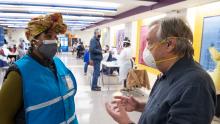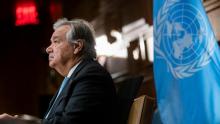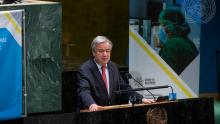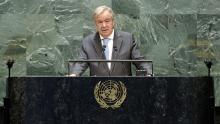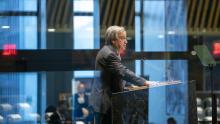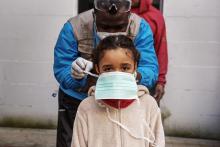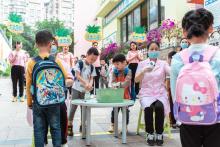António Guterres is the ninth Secretary-General of the United Nations, who took office on 1st January 2017.
Only together can we end this pandemic and recover
One full year into the COVID-19 pandemic, our world has faced a tsunami of suffering. So many lives have been lost. Economies have been upended and societies left reeling. The most vulnerable have suffered the most. Those left behind are being left even further behind.
2 million COVID-19 deaths: “Our world can only get ahead of this virus one way - together”
Our world has reached a heart-wrenching milestone: the COVID-19 pandemic has now claimed two million lives. In his video message, Secretary-General António Guterres encourages global solidarity to save lives, protect people and help defeat this vicious virus.
Stronger health systems and Universal Health Coverage must be a priority
Nearly a year into the pandemic, we face a human tragedy, and a public health, humanitarian and development emergency. For the first time since 1945, the entire world is confronted by a common threat, regardless of nationality, ethnicity or faith. But while COVID-19 does not discriminate, our efforts to prevent and contain it do. For that reason, the pandemic has hit the poorest and most vulnerable in our societies hardest.
Corruption is the ultimate betrayal of public trust
Corruption is criminal, immoral and the ultimate betrayal of public trust. It is even more damaging in times of crisis – as the world is experiencing now with the COVID-19 pandemic. Together, we must create more robust systems for accountability, transparency and integrity without delay.
"Scale up investment in Universal Health Coverage and in stronger health systems"
Nine months since we first heard of COVID-19, the pandemic has claimed more than one million lives and infected more than 30 million people in 190 countries. Infections are rising and there are troubling signs of new waves. Much about the virus remains unknown. But one basic fact is clear: the world was not prepared.
"We must never lose sight of each and every individual life"
Our world has reached an agonizing milestone: the loss of one million lives from the COVID-19 pandemic. It’s a mind-numbing figure. Yet we must never lose sight of each and every individual life. They were fathers and mothers, wives and husbands, brothers and sisters, friends and colleagues.
UN Plan to save lives, protect societies and recover better
This updated UN Comprehensive Response to COVID-19 report provides an overview of the data, analysis, policy recommendations and concrete support that the UN has made available to states and communities to cope with the health, socio-economic, humanitarian and human rights impacts of COVID-19.
"It is imperative that we rebuild the tourism sector"
Tourism is one of the world’s most important economic sectors. It employs one in every ten people on Earth and provides livelihoods to hundreds of millions more. It boosts economies and enables countries to thrive. It allows people to experience some of the world’s cultural and natural riches and brings people closer to each other, highlighting our common humanity. That is why it has been so painful to see how tourism has been devastated by the COVID-19 pandemic.
"The future of education is here"
Education is the key to personal development and the future of societies. It unlocks opportunities and narrows inequalities. It is the bedrock of informed, tolerant societies, and a primary driver of sustainable development. The COVID-19 pandemic has led to the largest disruption of education ever.
"Target women in all aspects of economic recovery and stimulus plans in Southeast Asia"
As in other parts of the world, the health, economic and political impact of COVID-19 has been significant across Southeast Asia — hitting the most vulnerable the hardest. The pandemic has highlighted deep inequalities, shortfalls in governance and the imperative for a sustainable development pathway.

